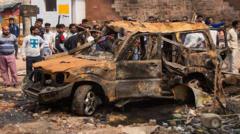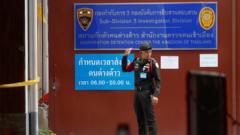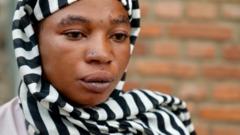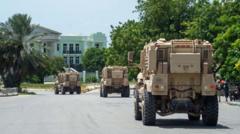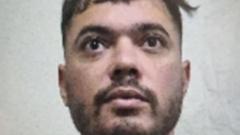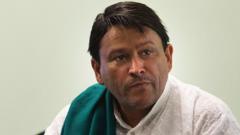On the backdrop of escalating lawlessness, Guatemala has sent troops to Haiti to assist in combating rampant gang violence that has destabilized the capital, Port-au-Prince.
Guatemalan Troops Deployed to Haiti in Latest Anti-Gang Effort
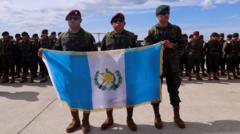
Guatemalan Troops Deployed to Haiti in Latest Anti-Gang Effort
International mission aims to stabilize Haiti amid ongoing gang violence and chaos
Guatemalan security forces, comprising 150 military police, have touched down in Haiti, aligning with United Nations-led initiatives designed to reclaim order in the beleaguered Caribbean nation. This deployment includes two batches of 75 soldiers each, arriving on consecutive days, and marks an urgent response to Haiti's pressing conflict with armed gangs that have seized control over vast areas. The situation has compelled the Haitian government into a months-long state of emergency.
Amid a backdrop of chaos, a larger international force is being mobilized to complement efforts led by the Kenyan police, who previously sent nearly 400 officers to help stem the violence. The ongoing crisis has prompted a UN approval for an international cohort aimed at re-establishing security, targeting a total of 2,500 personnel from diverse countries involved in the mission. Jamaica, Belize, and El Salvador have also committed to contributing a small number of troops, with the United States providing the primary funding for operations.
The deteriorating environment in Haiti has been exacerbated by recent events, including the dramatic storming of prisons by armed gangs in March 2024, resulting in the escape of around 3,700 inmates. With the Ouest Department, encompassing Port-au-Prince, remaining under a state of emergency since March 3, this complex scenario reflects Haiti's long history of political instability, economic despair, and natural disasters, rendering it the poorest nation in the Americas.
Haiti's challenges intensified after the assassination of President Jovenel Moïse in 2021, leading to a power vacuum and unchecked gang warfare. As violence continues, recent reports indicate gang-related attacks have resulted in multiple deaths, including an incident at a hospital. The evolving crisis has prompted the Haitian government to extend the state of emergency nationwide as they struggle to regain control amid widespread lawlessness.
Amid a backdrop of chaos, a larger international force is being mobilized to complement efforts led by the Kenyan police, who previously sent nearly 400 officers to help stem the violence. The ongoing crisis has prompted a UN approval for an international cohort aimed at re-establishing security, targeting a total of 2,500 personnel from diverse countries involved in the mission. Jamaica, Belize, and El Salvador have also committed to contributing a small number of troops, with the United States providing the primary funding for operations.
The deteriorating environment in Haiti has been exacerbated by recent events, including the dramatic storming of prisons by armed gangs in March 2024, resulting in the escape of around 3,700 inmates. With the Ouest Department, encompassing Port-au-Prince, remaining under a state of emergency since March 3, this complex scenario reflects Haiti's long history of political instability, economic despair, and natural disasters, rendering it the poorest nation in the Americas.
Haiti's challenges intensified after the assassination of President Jovenel Moïse in 2021, leading to a power vacuum and unchecked gang warfare. As violence continues, recent reports indicate gang-related attacks have resulted in multiple deaths, including an incident at a hospital. The evolving crisis has prompted the Haitian government to extend the state of emergency nationwide as they struggle to regain control amid widespread lawlessness.

